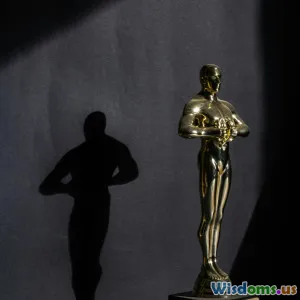
When Exceptional Soundtracks Outshine Weak Movie Scripts
8 min read Exploring how extraordinary film soundtracks can elevate movies despite weak scripts. (0 Reviews)
When Exceptional Soundtracks Outshine Weak Movie Scripts
In the vast and complex world of cinema, storytelling reigns supreme—or so conventional wisdom dictates. Yet, some films are remembered not for their plots, characters, or dialogue, but for their breathtaking soundtracks. It is a curious and artistic paradox when the music not only complements but actually outshines the movie itself. Why does this phenomenon occur? How can a film’s score uplift a flawed narrative and transform audience perception? This article explores these questions through insightful examples, scientific findings, and expert commentary, revealing the extraordinary power of soundtracks in the art of filmmaking.
The Power of Music in Cinema: More Than Background Noise
Music and film have a symbiotic relationship dating back to the silent film era, where live orchestras accompanied projected images to provide emotional cues. Today, a movie’s soundtrack serves multiple purposes: setting times and locations, building atmosphere, driving emotional engagement, and sometimes conveying subtext
But when scripts fail—whether through weak dialogue, inconsistent characters, or implausible plot points—a great soundtrack can offer an emotional anchor or distraction. According to musicologist Claudia Gorbman, film music operates "as an unconscious index of a film's emotional mood and narrative pacing." It memorably punctuates scenes, creating emotional resonance where the script may falter.
Cases Where Soundtracks Became the Star
1. Drive (2011): A Minimalist Score Defining Style
Nicolas Winding Refn’s Drive garnered mixed reviews for its narrative pacing and character development. Yet the haunting synth-heavy soundtrack by Cliff Martinez received universal praise. Tracks like "Nightcall" and "A Real Hero" didn't just support the scenes; their moody, pulsating rhythms synthesized with imagery to create an immersive aesthetic experience. The soundtrack’s retro-modern vibe became synonymous with the film’s cult status.
These songs helped audiences connect emotionally with otherwise sparse storytelling, engaging senses beyond visual narrative alone.
2. Tron: Legacy (2010): Daft Punk's Electronic Masterpiece
Tron: Legacy is a movie that visually dazzled yet faltered in delivering a compelling script for many viewers, criticized for underdeveloped characters and clichés. Enter Daft Punk's groundbreaking electronic soundtrack. The duo crafted a layered, immersive score blending orchestral and digital elements that not only complemented the film’s futuristic setting but outshone its story.
The fans regularly cite the soundtrack as a standalone work of art that invites repeated listening. Critic Heather Phares describes it as "an ambitious and thrilling soundtrack…creating an expansive musical landscape." It lifted the entire movie into cult status among audiophiles and sci-fi enthusiasts.
3. Blade Runner (1982): Vangelis Elevating a Neo-Noir Futuristic Drama
Ridley Scott’s Blade Runner wrestled with pacing and narrative structure upon release, yet Vangelis's electronic-and-ambient soundtrack is still considered one of the greatest in cinema history. Expressive compositions like "Tears in Rain" fused synth with melancholic melodies that underscored the film’s philosophical themes of humanity and identity.
The score created atmospheric depth that a straightforward sci-fi script alone struggled to convey effectively. In fact, many viewers discovered profound emotional responses driven foremost by Vangelis's sonorous soundscape.
Why Do Exceptional Soundtracks Elevate Weak Scripts?
The Neurological Impact of Film Music
Scientific studies have shown that music can profoundly influence an audience’s perception and retention of stories. Neuroscientist Dr. Daniel Levitin explains in his book This Is Your Brain on Music how soundtracks activate brain regions tied to memory, emotion, and expectation. When a script lacks cohesion, well-crafted music can stimulate emotional circuits enough to fill narrative gaps.
Music’s inherent ability to evoke responses like sadness, tension, or elation mirrors narrative intentions even when the script underdelivers. This creates a cognitive soundtrack “override,” where music transmits what dialogue or plot don’t.
Emotional Forgiveness via Soundtracks
Audiences may forgive storytelling shortcomings when music elicits strong feelings. As film critic Mark Kermode points out, a good score can compensate by "immersing the viewer’s emotions to such an extent that flaws in the storyline seem less important."
Thus, a powerful composition can become the emotional backbone of a film, providing continuity and intensity.
What This Means for Filmmakers and Audiences
For Filmmakers
Understanding the potential of a soundtrack is a key asset, especially in genres where visuals dominate. Films like Mad Max: Fury Road (2015) demonstrate how a driving, intensifying soundscape complements explosive imagery and enhances the narrative arc despite brief exposition.
Investing in exceptional composers and sound design is an essential strategy. Collaboration between directors and music supervisors can transform otherwise mediocre scripts into compelling cinematic experiences.
For Audiences
Recognizing the influence of music enables viewers to appreciate layers of storytelling beyond words and images. It fosters a deeper connection and slow-burn appreciation for films initially perceived as flawed.
Furthermore, engaging with soundtracks outside of the movie context often generates renewed enthusiasm and cultural cachet, turning films with weak scripts into iconic cult classics.
Conclusion: The Harmonious Dance of Script and Soundtrack
No screenplay is flawless, and even the most creative films may have narrative weaknesses. However, exceptional soundtracks possess the uncanny ability to reframe a film’s emotional dynamics and audience reception. By exemplifying mood, evoking empathy, and sustaining tension, music often eclipses the written word on screen.
The triumphant scores of movies such as Drive, Tron: Legacy, and Blade Runner illuminate a creative truth: cinema is an audiovisual art, and sometimes sound leads where story struggles to follow. For creators and consumers alike, it's a reminder to listen closely to every note—not just every line.
References and Further Reading:
- Gorbman, Claudia. Unheard Melodies: Narrative Film Music. Published 1987.
- Levitin, Daniel J. This Is Your Brain on Music. 2006.
- Phares, Heather, AllMusic Reviews on Tron: Legacy Soundtrack.
- Kermode, Mark. Film critic commentary on music's role in movies.
Featured Soundtracks Mentioned:
- Cliff Martinez – Drive Soundtrack
- Daft Punk – Tron: Legacy Soundtrack
- Vangelis – Blade Runner Soundtrack
Author’s Note: This article seeks to illuminate how film soundtracks wield an emotional power uniquely capable of elevating even flawed narratives, proving why music is an indispensable cornerstone of the cinematic experience.
Rate the Post
User Reviews
Popular Posts


















